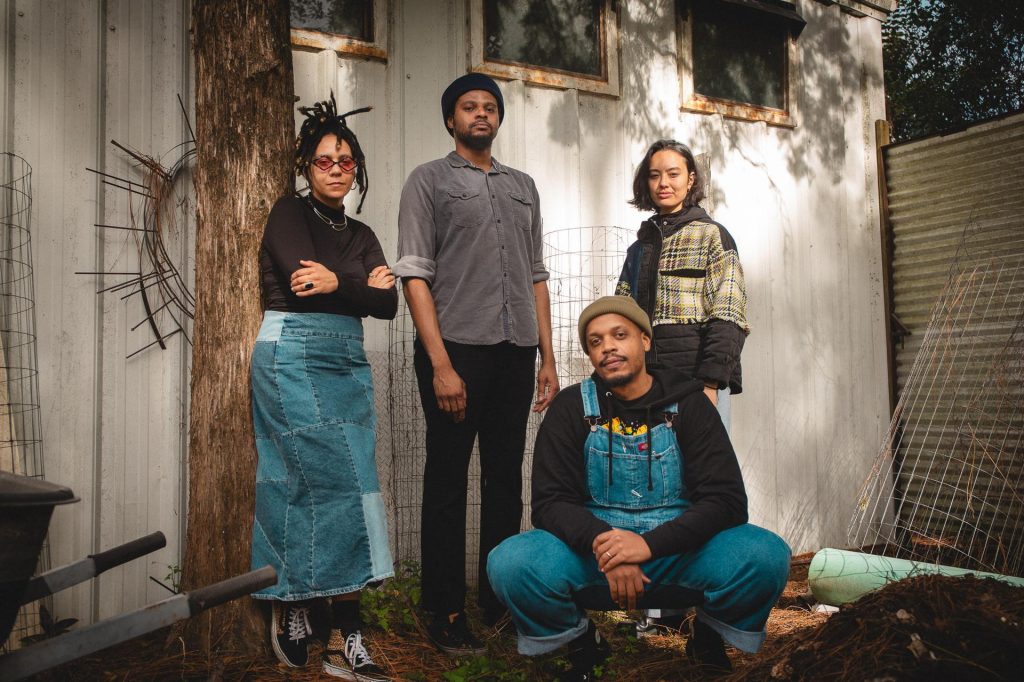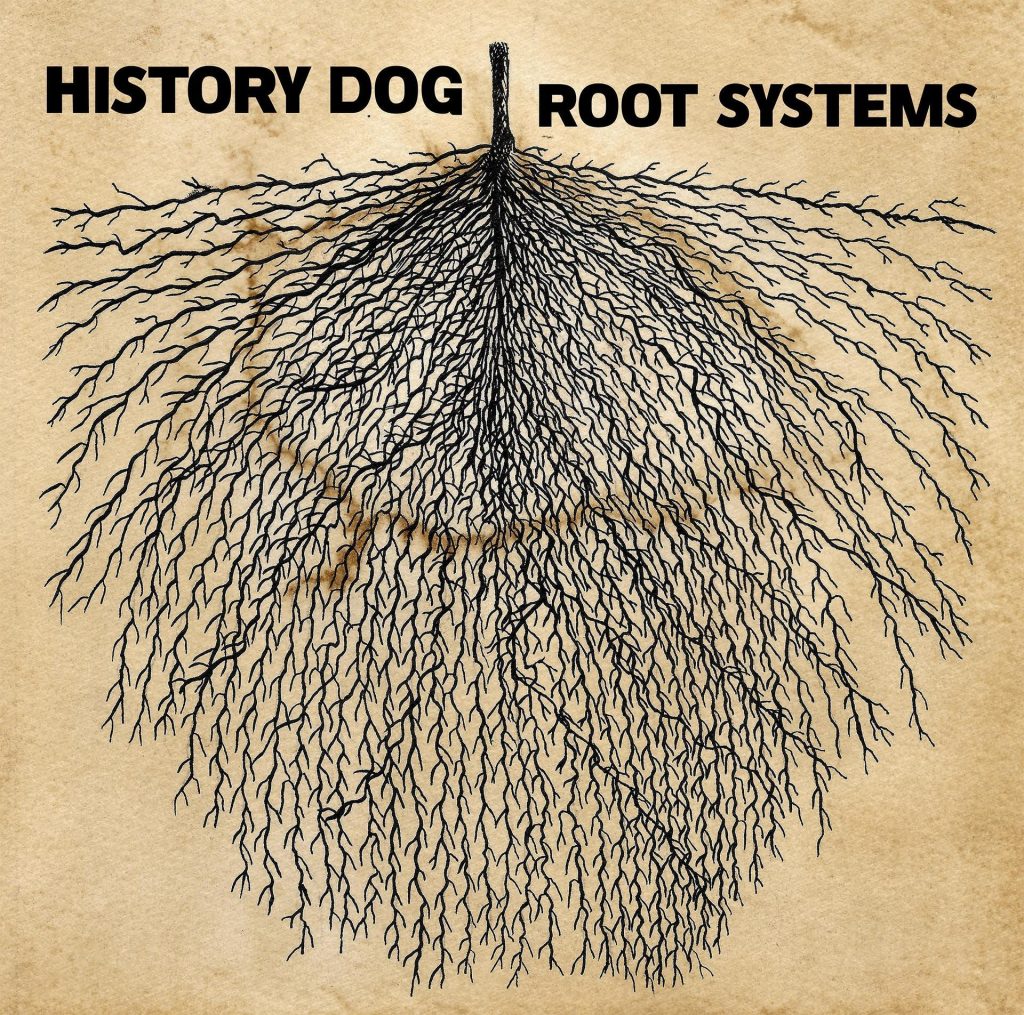Jazz Group History Dog to Release New Project “Root Systems” on May 9th, 2025 | LISTEN!
History Dog (Shara Lunon, Luke Stewart, Lesley Mok, Chris Williams) announce debut album: ‘ROOT SYSTEMS,’
out May 9 on Otherly Love Records
First single “Chaotic” out March 7
Every community has a collective Id that hides just below its emotional surface. The observant could spot it when paying the right amount of attention. But for those not looking or listening, this energy is likely to remain invisible until it’s too late and they’ve been swamped by it. History and art aren’t communities per se, but they too evolve in tune with this mass feeling, their progress is rooted in it, even driven by it.
History Dog is a quartet of highly lauded Brooklyn-based improvisers. They’re scholars of the local and global Id, experts at accessing it within any number of distinct musical worlds (jazz, punk, noise, classical, avant-garde), always shaping personal dialects which address this subterranean collective imagination. Like all great improvisers, they feel it as it’s taking shape. So while you may be arriving at History Dog’s debut album, Root Systems, to check out this cool coming-together of a Brooklyn underground super-group, you’re likely to leave in thrall to a slightly different sound of Now.
History Dog is trumpeter Chris Williams (he/him), drummer Lesley Mok (they/them), bass guitarist Luke Stewart (he/him) and vocalist Shara Lunon (she/they). Each one is an active presence in New York’s music community, who, having established their individual practices in/around the jazz tradition, has chosen to travel far beyond its prescribed borders. Their expansive interests have led them to embrace electronics, to reconsider the roles of their primary instruments, and to embrace a decidedly post-genre attitude. The weight of their collective chops and credits reveal a high cultural standing. Yet if they’re not touring with jazz legends and arts notables, or contributing to kunsthalle programming somewhere around the world, you’ll find them around Brooklyn’s various DIY haunts, playing with one another, or any number of friends and colleagues. Each regularly produces and curates nights, sharing sounds and ideas, constantly uniting around the music to see what else can happen. This is why they’re fluent in the Id, in producing what Lunon calls “pure expression of feeling that speaks to the culture of our city and community.”
Though members of History Dog had often played with one-another in various configurations, the quartet first came together organically in August 2023, for Heavy Florals, Lunon’s occasional experimental-music gathering at Sisters in Clinton Hill. Stewart was a last-second stand-in for another musician who couldn’t make it. Their shared prompt was applying an electroacoustic approach to a longform build (playing uninterrupted beginning to end), and seeing where it all shakes out. Lunon had a few phrases and vocal effects, Williams’ trumpet and Stewart’s Fender bass were filtered through an arsenal of pedals, and Mok was armed with their usual quickness of mind and tidal kit attack. The night began with technical difficulties but ended in a revelation, a mountain of sound, and in Mok’s memory, “a clarity of vision. I clearly remember the last 20 minutes of the piece. We were all in this tunnel together, seeing the end, and hungry to get there.”
It could have ended like so many other great gatherings in this community: one magnificent night, and onto the next one. But a couple of months later there was another occasion to syncretize, at a house show, and the certain magic reappeared. Then came an opportunity in Gainesville, Florida, where Lunon had gone to school and still has her people, centered around the Pulp Arts studio, a hub for musicians both local and far-flung. Williams had been invited to the studio as well. Suddenly, a band whose “journey” was less than six months old, a prodigiously-gifted quartet that had barely formed a common language, a young Brooklyn family going on a deep-South retreat, decided to make an album.
The danger of a completely open space is formlessness. The super-power of brilliant improvisers is the creation of form out of nothing (plus whatever’s available). The excitement of handing over experimental tools to artists adept at using them, is the prospect of something new emerging fully formed from the group’s collective imagination. The quiet Id, come alive.
History Dog’s four days of recording Root Systems at Pulp Arts began kinda expectedly: live takes of long pieces, a band willing its sound into being (something almost no new band can actually afford to do in a professional studio in 2024). Still, they arrived with specific directions: Lunon, a writer and voracious reader, had phrases from works by Claudia Rankine and Hanif Abdurraqib (History Dog’s name comes from a poem by Danez Smith) and from her own recent work, which emphasizes the non-white American experience and a desire to “call people in instead of just calling people out.” She was also looking to use her voice not as a lead instrument, but to fold it into the improvising ensemble. Williams too was seeking to “push the trumpet forward but not out front,” to develop the horn’s “cyborg-ification” textures, like finding ways to use it as a rhythm guitar. The forever questing Stewart, with projects that span the creative music continuum, was interested in exploring an electroacoustic practice in a group dynamic. And Mok, whose fluid approach to rhythm has made them a star in jazz-critical circles, looked to challenge themself and contend with playing in a way they’d “never really played before.” Still, after two days, History Dog simply playing together had run its course.
The reason Root Systems is more evocative of things like ambient-noise sculptures, or late-’70s No Wave freak-outs, or the drone architecture of European post-techno labels, than of anything akin to “jazz,” is how History Dog decided to finish what they started. By embracing what Mok calls the “tensions of our collective identity,” and by inviting the studio (and its engineer, Danny Clifton) to join the band. On the third day, they began listening back to what they’d recorded and started to shape the sound. Out came the Pulp Arts tape machines to splice together, process and collage, extend, overdub and loop pieces into new forms. Recordings mutated into “tracks,” the language influencing the mind-set. 20-minute jams were trimmed Teo Macero-style, layered with synths and effects, blossoming with intensity. Minor asides were molded into stand-alone creations. You can almost imagine Eno’s Oblique Strategies deck in the desk drawer.
And what makes the sonic experimentation of Root Systems especially potent is its decidedly non-white perspective and sound. Choose at your own peril to ignore History Dog’s collective identity, how it informs both content and form. It is, for instance, natural that one of Lunon’s acerbic spoken-word asides on “Hilarious,” the relative linear martial drums+bass+trumpet piece where the vocalist tries laughing off something offensive (“How are you gonna take that, and say that’s yours? Come on man!”), should then become centerpiece of “Hilarity,” a darkly synthetic elegy full of constricting space. Or that the ambient-gospel “Honest” is built on Lunon’s disembodied voice slowly unfolding the phrase, “I am less interested in things getting better, than I am in them becoming honest,” while a spare staccato Mok sounds like Denardo Coleman on “The Empty Foxhole,” and the accompanying mellophone and modular synth percolate, The Root Systems at play here are familiar to all. And yet in History Dog’s desire to bend sound while giving voice to its community’s Id and speaking to the moment, the quartet has achieved something remarkable.
Says Luke Stewart, “Perhaps Root Systems is an example of how a truly experimental situation can be effective and powerful. The album covers all the bases of a purely experimental music, sonically and situationally: us coming together in a completely open improvisatory sense, utilizing our instruments in a non-traditional way, experimenting with how those sounds fit together, and also with how we can utilize the studio, the time, and the space in order to achieve that. To begin with no real thematic direction, but then find a message within the music, based on not just words but the experience that we all shared together in Gainesville, the feelings that we put into the sound reflecting those things.”
Photo credit: Abigail Clark. R-L – Shara Lunon, Luke Stewart, Chris Williams, Lesley Mok.
RELEASE DATE: May 9, 2025
Fully Altered Media

